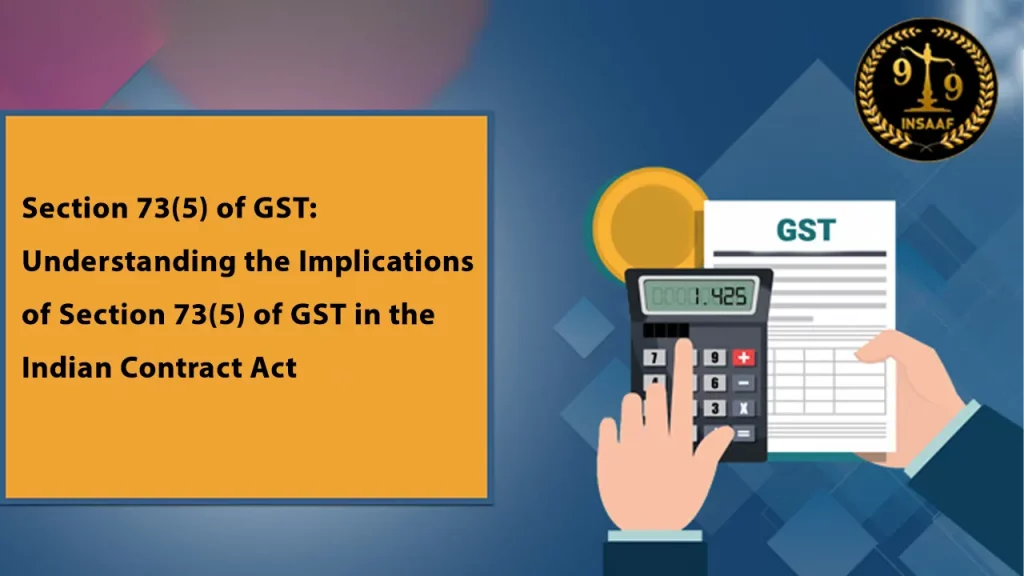
The legal landscape can be intricate, and navigating the intersection of different laws can be particularly challenging. This is especially true when dealing with taxation regulations. Tax compliance is a crucial aspect of any business operation, and the Goods and Services Tax (GST) regime in India is no exception.
Section 73 of the Central Goods and Services Tax (CGST) Act, 2017, plays a vital role in ensuring tax compliance by addressing situations where tax has not been paid or has been short-paid, among other related issues. The Goods and Services Tax (GST) framework in India has ushered in a paradigm shift in taxation. Amidst its complexities, understanding specific sections is paramount. Section 73(5) of the Central Goods and Services Tax (CGST) Act assumes significance in the tax determination landscape, and here’s an exploration of its role:
Corrective Actions in GST: Decoding Section 73(5) of the CGST Act
Section 73(5) of the CGST Act allows for voluntary correction of errors. Before facing formal action, taxpayers can rectify mistakes and pay outstanding tax, interest, and penalty. This promotes self-compliance, reduces legal burdens, and fosters transparency in the GST regime.
Scope of the Section: Section 73(5) specifically addresses situations involving tax discrepancies, including non-payment, short payment, erroneous refunds, or improper utilization of input tax credit under the CGST Act.
Empowerment of Proper Officer: This provision grants authority to the proper officer, a designated GST official, to initiate actions when discrepancies are identified.
Conditions for Action: The proper officer acts under Section 73(5) in cases unrelated to intentional evasion (fraud), willful misstatement, or suppression of facts.
Section 73(5) enables corrective measures by GST officials for unintentional tax-related errors or discrepancies.
However, the party can also choose to preempt this process by voluntarily paying the outstanding amount along with interest and a penalty before the notice is served. This option allows for quicker resolution and avoidance of further penalties.
Also Read :- Documents Required For GST Registration Full Guide
Breakdown of Section 73(5) of the CGST Act:
Show Cause Notice Issuance: The proper officer has the authority to issue a show cause notice to the individual responsible for unpaid or short-paid tax. The notice demands an explanation and requires payment of the due amount, including interest and penalties.
Payment Before Notice: Before the notice is served, the individual has the option to proactively pay the outstanding tax and interest, notifying the proper officer of the payment.
Determining Amount Payable: Section 73(5) allows the individual to calculate the payable tax either based on their assessment or the amount determined by the proper officer.
Interest and Penalty: Interest, as per Section 50 of the CGST Act, is applicable. A penalty, equivalent to 10% of the tax amount, is also imposed.
Explanation Opportunity: The show cause notice offers an opportunity for the individual to provide explanations for the discrepancy and present their case.
Hearing Adjournment: The proper officer can grant adjournments during the hearing, but limitations exist to prevent excessive delays in proceedings for the same individual.

Exploring Distinctions: Section 73(5) in Comparison with Other Relevant Provisions
Understanding the nuances between Section 73(5) and similar provisions is pivotal for effective GST compliance.
Section 73 vs. Section 74 of the CGST Act: Differentiating Section 73 and Section 74 of the CGST Act is crucial. Section 74 pertains to tax discrepancies resulting from fraud or willful misstatement, imposing a higher penalty (25% of the tax amount) with an extended notice period of 5 years.
Section 73 of the Indian Contract Act: Additionally, considering Section 73 of the Indian Contract Act becomes relevant. While seemingly unrelated to GST, it addresses the “impossibility of performance” in contracts due to uncontrollable circumstances. This connection may apply in specific situations where tax non-payment or short-payment arises beyond the taxpayer’s control.
Conclusion
Section 73(5) of the GST Act plays a significant role in promoting voluntary tax compliance. By enabling taxpayers to rectify errors and pay outstanding tax, interest, and penalty before facing formal action, it encourages transparency and reduces unnecessary legal complications. This provision is particularly valuable in the dynamic GST environment, where staying informed about legal updates is crucial for businesses and individuals to navigate the ever-changing landscape. As the GST regime evolves, the importance of Section 73(5) in fostering a self-compliant ecosystem will undoubtedly continue to grow.
Insaaf99: Transforming Legal Consultation in the Digital Age: Your Guide in Tax Compliance Issue
Insaaf99, an online legal consultation platform, facilitates accessible and affordable legal advice. Leveraging digital connectivity, it connects users with legal experts, offering timely and cost-effective solutions. The platform’s confidentiality measures, diverse expertise, and flexible scheduling enhance user experience, bridging gaps in traditional legal services. Insaaf99 plays a crucial role in democratizing legal access, aligning with the modern era’s demand for efficient, convenient, and inclusive legal solutions.
FAQ:
What is Section 74 5 in GST?
Section 74(5) allows a taxpayer, before receiving a notice for unpaid or short-paid tax, to pay the outstanding amount with interest and a 15% penalty to avoid further legal action.
What is Section 75 of the CGST act?
Section 75 of the CGST Act outlines the general provisions relating to determination of tax. It focuses on:
Issuing show-cause notices to individuals with potential tax liabilities.
Granting opportunities for a hearing and representation before finalizing the assessment.
Ensuring tax demands are based on the grounds specified in the notice.
Maintaining a time limit for issuing orders based on appellate authority directions.
Granting adjournments of hearings under specific conditions.
What is the penalty under 74 5?
Under Section 74(5) of the CGST Act, a penalty of 15% applies if the taxpayer voluntarily pays the outstanding tax amount, along with interest, before receiving the show-cause notice issued by the proper officer. This provision allows taxpayers to avoid the potentially higher penalty of 25%, which is imposed if the tax is not paid voluntarily before the notice is issued.

 CALL NOW +91 – 8800110989
CALL NOW +91 – 8800110989